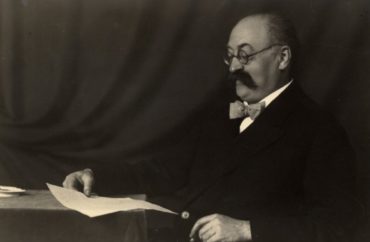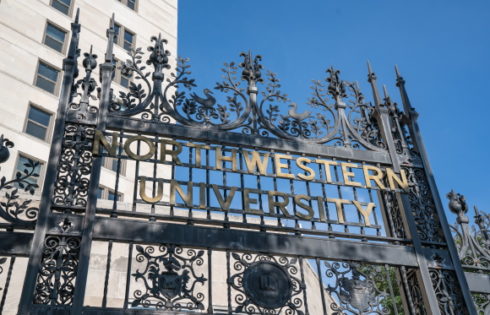
‘At least one individual’ was ‘coerced’ into signing petition against him
The University of Northern Texas denies that its investigation into an academic journal accused of racism will chill the academic freedom of faculty.
Timothy Jackson, a distinguished university research professor, is under investigation with other editors at the Journal of Schenkerian Studies. Students and faculty publicly condemned both the editors and the journal for a recent volume that debated the namesake of the journal, the 19th century music theorist Heinrich Schenker (above).
Jackson is considering legal action against the university, his attorney Michael Allen told The College Fix via email. “Please understand that Professor Jackson,” who is currently ill, “is fighting for his life’s work right now,” and the investigation has had an “immediate and detrimental effect on” the professor’s health, Allen said.
 He said “at least one individual” has “indicat[ed] they were coerced into signing the petitions that now swirl around the internet denouncing” Jackson (left) and his journal. The lawyer was not more specific about this individual or Jackson’s illness.
He said “at least one individual” has “indicat[ed] they were coerced into signing the petitions that now swirl around the internet denouncing” Jackson (left) and his journal. The lawyer was not more specific about this individual or Jackson’s illness.
The controversial volume was a response to a 2019 paper, and later a plenary address, by Hunter College Prof. Philip Ewell in the Society for Music Theory’s journal Music Theory Online. Ewell’s paper sought to explain the “white racial frame” that is “structural and institutionalized” in the field of music theory.
The black professor argued that Schenker was “an ardent racist and German nationalist” whose ideas exist “to benefit members of the dominant white race of music theory.”
MORE: Suit says UNT fired prof for calling microaggressions handout ‘garbage’
Volume 12 of the UNT-produced journal presented a collection of critical responses to Ewell’s paper to convey a “variety of thoughts and perspectives.” Jackson’s own critique called Ewell’s work an attempt to construct a “conspiracy theory” around Schenker, who was Jewish, that is “part and parcel of the much broader current of Black anti-semitism.”
Asked to explain why the public university’s investigation isn’t unconstitutional or won’t have the effect of chilling protected speech in the future, UNT Vice President Jim Berscheidt gave The Fix the stock response it has given other media outlets.
“The University of North Texas is committed to academic freedom and the responsibility that goes along with this freedom,” the statement reads. “This dedication is consistent with, and not in opposition to, our commitment to diversity and inclusion and to the highest standards of scholarship and professional ethics.”
The Foundation for Individual Rights in Education intervened on behalf of Jackson, warning the university in a letter Thursday that the investigation was “unwarranted” and unconstitutional in and of itself, regardless of possible sanctions. An accompanying FIRE statement demanded “the immediate cessation” of the investigation.
One of Jackson’s colleagues in the Division of Music History, Theory, and Ethnomusicology explained via email to The Fix why he signed a letter by MHTE faculty calling for “[r]esponsible parties” to be held “appropriately accountable” for the volume.
Asked if he had any concerns that his call for sanctions could be similarly applied to his own controversial remarks, Andrew Chung responded: “I would say that I would hope in the future not to make remarks that aggrieve my fellow members of my discipline.”
Anonymous students call for ‘investigating past bigoted behaviors by faculty’
Jackson’s faculty page says he founded the Center for Schenkerian Studies in the College of Music in conjunction with the university’s establishment of the Reinhard Oppel Memorial Collection. It includes about 10,000 pages of “musical manuscripts, rare musical editions and books on music.”
Just as the volume was to be published, an unknown number of MHTE graduate students released a statement July 29 condemning the issue for the “platforming of racist sentiments.” It accused the journal of fomenting racist attacks on Ewell (below) and his scholarship.
They complained that the journal is “presented as graduate student run in some contexts” when in fact they have “absolutely no say” in its content. They will seek to “change every part” of the MHTE and College of Music because it “allowed faculty to platform racism in our name.”
MORE: Princeton students slurred as racist for defending academic freedom
 The statement claims UNT has “a reputation as an institution with a toxic culture when it comes to issues of race, gender, and other aspects of diversity,” as evidenced by volume 12 of the journal.
The statement claims UNT has “a reputation as an institution with a toxic culture when it comes to issues of race, gender, and other aspects of diversity,” as evidenced by volume 12 of the journal.
The unidentified students demanded both an investigation into the journal as well as its complete dissolution, calling on UNT to “[h]old accountable every person responsible for the direction of the publication.” That includes “investigating past bigoted behaviors by faculty” and “the discipline and potential removal of faculty who used the JSS platform to promote racism,” including Jackson.
Ewell also encouraged his Twitter followers on Twitter to “please read and sign” an “Open Letter on Antiracist Actions” within the Society of Music Theory in response to volume 12. He has not read the entire volume and doesn’t plan to, telling Inside Higher Ed: “I refuse to participate in my own dehumanization.”
Shaming colleagues is ‘one of the standard tools of the free marketplace of ideas’
Following the faculty letter supporting graduate student demands, College of Music Dean John Richmond announced “a formal investigation” into the journal and its editors.
UNT’s policy on academic freedom would appear on its face to block the investigation. It gives faculty members the right “to study, discuss, investigate, teach, conduct research and/or creative activity, and publish, perform, and/or display their scholarship freely as appropriate to their respective UNT-assigned roles and responsibilities.”
They must “clarify that they are not official spokespersons” for the university, and must not use “official letterhead or other university resources,” when they express their “opinions as privately engaged citizens.” The restrictions do not apply to “the opinions formulated from their use of the reliable methods of their discipline,” which seemingly applies to their work on the journal.
UNT spokesperson Berscheidt portrayed the investigation as an audit of the journal’s processes, not an inquisition into its content. “We will continue to offer music theorists the opportunity to share and defend diverse viewpoints under the most rigorous academic standards and ethics,” he wrote.
“The university has appointed a five-member multidisciplinary panel” of non-College of Music faculty who are “experienced in the editing and production of scholarly journals,” Berscheidt continued. They will “examine objectively the processes followed in the conception and production of volume 12,” probing “whether the standards of best practice in scholarly publication were observed.”
MORE: Ex-Harvard Med dean denounces mandatory faculty diversity statements
The panel will “recommend strategies to improve editorial processes where warranted” in a report to Provost Jennifer Cowley, which “will be made public.” He didn’t specify when it would be made public.
While the Society for Music Theory’s condemnation of the volume somewhat echoed Berscheidt’s emphasis on the editorial process, its executive board accused the journal of “anti-Black statements and personal ad hominem attacks” on Ewell.
The volume “failed to meet the ethical, professional, and scholarly standards of our discipline,” avoiding “the normal processes of peer review” and failing to invite Ewell to respond, and some contributors “violate our Society’s policies on harassment and ethics.”
Such actions constitute “silencing, designed to exclude and to replicate a culture of whiteness”:
These are examples of professional misconduct, which in this case enables overtly racist behavior. We humbly acknowledge that we have much work to do to dismantle the whiteness and systemic racism that deeply shape our discipline. The Executive Board is committed to making material interventions to foster anti-racism and support BIPOC [black, indigenous and people of color] scholars in our field, and is meeting without delay to determine further actions.
MORE: Faculty forced to pledge allegiance to diversity or lose their jobs
“The treatment of Prof. Ewell’s work provides an example of the broader system of oppression built into the academic and legal institutions in which our disciplines exist,” according to the letter by 17 MHTE faculty in support of grad students.
Volume 12 “is replete with racial stereotyping and tropes,” and while not all its contributions include “such egregious material,” it promotes “a racist discourse that has no place in any publication.” It lacked a “clearly defined peer-review process” and should have let Ewell “respond in print.”
“Responsible parties must be held appropriately accountable,” the letter demanded, without specifying the form of accountability.
 Three of the signatories responded to Fix queries: music theorists Frank Heidlberger and Andrew Chung and music historian Peter Mondelli. Only Chung (left) agreed to an interview.
Three of the signatories responded to Fix queries: music theorists Frank Heidlberger and Andrew Chung and music historian Peter Mondelli. Only Chung (left) agreed to an interview.
He declined to specify what form of accountability he wants “because I do not speak for the university on such matters.” Chung emphasized that “while I personally disagree with some of the language and editorial choices Professor Jackson made or was involved in, I hold no animus against Professor Jackson the person.”
Chung himself strives not to “aggrieve” peers in his discipline, “because I am cognizant that such calls against faculty members are one of the standard tools of the free marketplace of ideas, just as boycotts or consumer pushback are standard tools of the free market generally.”
‘Who will risk voicing unpopular opinions or even study classical music theory?’
The accountability sought against Jackson has been moblike in nature, according to his lawyer.
“There has been enormous pressure on contributors to the journal[,] on faculty and among graduate students to ‘apologize’ for engaging in ordinary scholarly discourse, and many have done so,” Allen answered when asked about internal pressure at UNT to apologize or recant for publishing the volume.
He cited pressure from “Twitter mobs” alongside “the mob of signatories of graduate student and faculty petitions calling for the silencing of the journal and for Professor Jackson to be fired.”
This amounts to “harassment” for simply defending music theory and disputing that Schenker was a “virulent racist” or that studying Schenker amounted to “institutional racism,” Allen said.
It’s self-evident that the investigation will have a chilling effect, he continued:
Who will risk voicing unpopular opinions or even study classical music theory, knowing that UNT faculty and administrators cower before baseless accusations of “racism” brought against ideas and research published in even the most specialized scholarly venues?
FIRE’s letter to President Neal Smatresk (below) warns that UNT cannot constitutionally “penalize faculty or the Journal itself because of disagreement with the editorial and peer review process followed by the Journal.” It also can’t punish faculty or grad student educators because “some or many found JSS’s content offensive.”
MORE: Smatresk caught trying to get Donald Trump Jr. disinvited from event

Even without formal punishments at the end, the investigation itself constitutes “an implicit threat of discipline,” with the “resulting chilling effect” on protected speech presenting “a cognizable First Amendment harm.”
Robert Shibley, FIRE’s executive director, quipped in its public announcement: “This just goes to show you that no area of academia, however obscure, is immune to those who demand that opposing viewpoints be silenced.”
A FIRE spokesperson told The Fix that it hadn’t determined how many graduate students joined the letter against Jackson that prompted the university investigation.
The civil liberties group “has not noticed a history of UNT engaging in this type of investigation, but even one unwarranted investigation is too many,” he added.
MORE: Medievalists ban ‘microaggressions’ against ‘vulnerable’ scholars
IMAGES: Schenker Documents Online, University of North Texas, Hunter College
Like The College Fix on Facebook / Follow us on Twitter






Please join the conversation about our stories on Facebook, Twitter, Instagram, Reddit, MeWe, Rumble, Gab, Minds and Gettr.